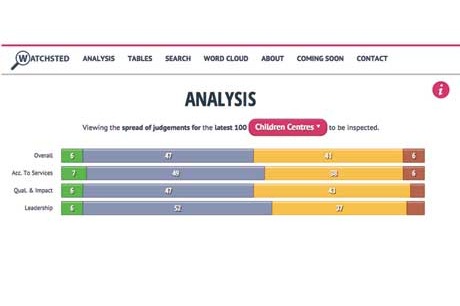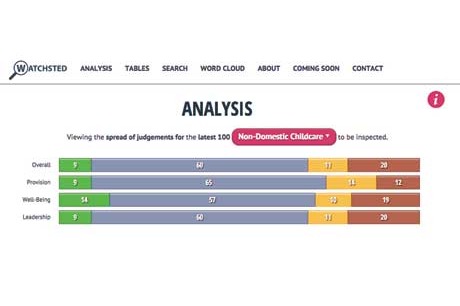performance is poor in comparison to other types of childcare provision.
Gabriella Jozwiak investigates the facts behind the figures.

In Ofsted's most recent children's centre inspection results, less than half achieved a good or outstanding grade. From April to June 2014 it inspected 89 centres, of which only 3 per cent achieved an overall outstanding, and 45 per cent were good. A further 42 per cent were judged as requires improvement, and 10 per cent were inadequate.
The results for the centres, which offer support services to families with children under five in local communities, continue a declining trend since 2010 when Government funding for this provision was pooled with other early intervention funding streams. Then, the resultant Early Intervention Grant was worth about £3bn in today's prices, according to the Children's Society. In 2015, the value of the grant shared between local authorities will have halved to about £1.5bn.
The latest results represent only a small proportion of some 3,300 children's centres in England (an actual total is unclear because of 'cluster' sites). But Ofsted results from November 2013 to March 2014, from 190 centres, were similar - only three per cent outstanding and 46 per cent good.
This is a sharp fall from 2010, when between October and December Ofsted inspected 164 sites. It found 12 per cent to be outstanding and 63 per cent good. Only one per cent was inadequate. Results for children's centres are also worse than for childcare providers and schools. Between April 2014 and 30 June 2014, the watchdog inspected 4,952 childcare providers and awarded 74 per cent an overall good or outstanding grade.
Between September 2013 and 31 August 2014, Ofsted inspected 6,469 maintained schools (including nursery, primary, secondary, special and pupil referral units). It judged 63 per cent good or outstanding.
So why are children's centres performing so badly? Linda Uren, director of children's services at Gloucestershire County Council, who heads the Association of Directors of Children's Services early years group, says Ofsted's inspection framework is partly to blame.
'This isn't a criticism of Ofsted, but the framework has a number of criteria in it that are very tough for children's centres to achieve, especially when you have declining budgets,' she says. 'There's an expectation children's centres will reach high numbers of families in the local area. Judgments are also made, for example, on the percentage of women who are breastfeeding.
'All those things are attributed to the children's centre, and the problem is, as budgets get tighter and lots of local authorities ask children's centres to focus on vulnerable families, they are going to find achieving some of those benchmarks tough.'
This problem was illustrated recently in South Somerset, where a newly formed group of five children's centres was graded inadequate by Ofsted in October 2014. The report highlighted that 'not enough families attend centres in the group' and 'only a minority of some priority groups use its services'.
Somerset County Council's cabinet member for children and families Frances Nicholson says the authority is making improvements as a result. 'We had already identified many of the issues ourselves - for example, the need to target services more at those in most need - and taken steps to address them through the restructuring of services,' she says.


End to universal provision
However, Action for Children service development manager Maureen Nuttall, who is responsible for the charity's more than 200 children's centres, says while it is understandable children's centres have to target services at the most vulnerable families because of decreased resources, the reduction of universal provision is another reason they underperform. 'It actually reduced a lot of access pathways, not only for children in the reach area, but also for vulnerable children,' she says.
Ms Nuttall also points out that Ofsted inspects leadership and governance. She says grouping arrangements of centres have resulted in shared management posts, where it is harder for leaders to demonstrate good leadership and governance. She gives the example of the role leaders play in brokerage and reporting to local advisory boards. 'It takes very strong, confident leaders to put a report to an advisory board that identifies where their health, education, police or social care are not helping,' she says.
She also explains that Ofsted inspects children's centre data collection, and how well a site triangulates data with other local information. 'In the early days each children's centre had a data and finance officer trained and qualified in collecting, analysing and cross-triangulating data, so the manager could work with them,' says Ms Nuttall. 'A lot of our centre managers now would say: "I know my data, I know what I've got control of, but I really struggle to triangulate the data of other people, because sometimes I can't get access to it and they don't collect the same things". Data has been the crucial issue of whether you're able to evidence your impact and outcomes effectively, which really impacts your Ofsted inspections.'
Centre for Research in Early Childhood director Chris Pascal, who works out of St Thomas Children's Centre in Birmingham, suggests another cause for falling Ofsted ratings is local authorities commissioning out services. 'I'm talking anecdotally - there's been no research on it - but I've spoken to two or three local authorities in this past month that have said they outsourced their children's centres, the quality went down, the range of services went down, children's centres that were full became empty, and they can't possibly hit their targets, so they're bringing them back in-house,' she says.
Ms Pascal says national providers lack the local knowledge and relationships to support families. She says networks between children's centres and local early education provision are vital to maintain quality. 'The way we've been able to maintain our "outstanding" at St Thomas is because we're linked to a local authority nursery school, which brings additional professionalism, capacity and resource,' she says. 'You get outstanding provision where you haven't got standalone children's centres but they're part of an integrated, locality-based offer.'
She also suggests Ofsted's current inspection framework, which ends in August 2015, expects unrealistic outcomes considering the amount of resource available.
According to an Ofsted spokesperson, the framework measures 'the extent to which resources are used effectively and efficiently to meet agreed local priorities and the needs of targeted children and families.
'We have been talking to council leaders and the Department for Education about the role children's centres play, in particular helping young children from poorer backgrounds prepare to be ready to learn at school. We will set out our new approach this year.'
A DfE spokesperson says, 'We are committed to improving quality and all local authorities should take swift action to raise standards in underperforming children's centres. Ofsted's new inspection framework is shining a light on areas where children's centres can improve.
'Local authorities are best placed to make decisions on where to target childcare provision and we have increased funding for early intervention to £2.5bn to help them meet the needs of their communities.'
CASE STUDY: WARWICKSHIRE
Atherstone Nursery School and Bedworth Heath Nursery School (both Early Years Teaching Centres) executive headteacher Amanda Kin says: 'Warwickshire had six integrated nursery schools and children's centres. They needed to change because of Government spending reductions. At first we were exempt from the tender process. A public consultation reorganised us into groups. The school I ran in Bedworth became responsible for three centres, and a school I head in Atherstone became responsible for five centres.
'In September 2013, Warwickshire County Council said we had to tender. This ran from November 2013 to May 2014. At the end, all the contracts were awarded to Barnardo's apart from a few in the south of the county, run by the Parenting Project.
'We ran our contracts until 31 August then the children's centres were separated from our nursery schools. The Atherstone site has two purpose-built buildings, developed to deliver integrated provision. The school and children's centres are now separate - one run by Barnardo's and one by us.
'We've spent the past 12 months tendering for a contract we were never going to win, closing down a children's centre and federating two nursery schools some 15 miles apart. We lost staff who took a compromise agreement or moved to Barnardo's.
'The local authority says nothing's disappeared - it's just change. But the centres have all gone through a restructure, so staff have been lost. Rather than delivering 37-hours of services a week, some centres only open for 15 hours of family support work. Whereas previously I was manager of one nursery school and one children's centre, with a reach of about 1,200 families, now the manager is in charge of two children's centres that work in partnership with a third children's centre covering five communities.
'In the north of the county, a new cluster, Mancetter and Coleshill children's centres, was inspected by Ofsted in November. It got an overall grade of requires improvement. When Mancetter was inspected individually in 2012, it received "good".
'The local authorities are just doing what they can to meet their budgets, because of massive spending restrictions. I couldn't hand-on-heart tell you any local authority officer wanted this to happen - they're as devastated as us. But the Government is masking the truth. It says children's centres aren't closing, which is true. But the amount of services they're offering, and the strategic leadership of those services, is diluted by the group and hub model.'
MORE INFORMATION
- Breaking Barriers: how to help children's centres reach disadvantaged families, The Children's Society, www.childrenssociety.org.uk/news-and-blogs/our-blog/breaking-barriers-funding-challenge
- Children's centre census for 2014, 4Children, www.4children.org.uk/Resources/Detail/Children-Centres-Census-2014
- Foundation Years Children's Centre Knowledge Hub, www.foundationyears.org.uk/category/childrens-centre-knowledge-hub
- Mancetter and Coleshill cluster Ofsted report, November 201, http://reports.ofsted.gov.uk/inspection-reports/find-inspection-report/provider/ELS/80217
- Ofsted inspection results, www.watchsted.com.
